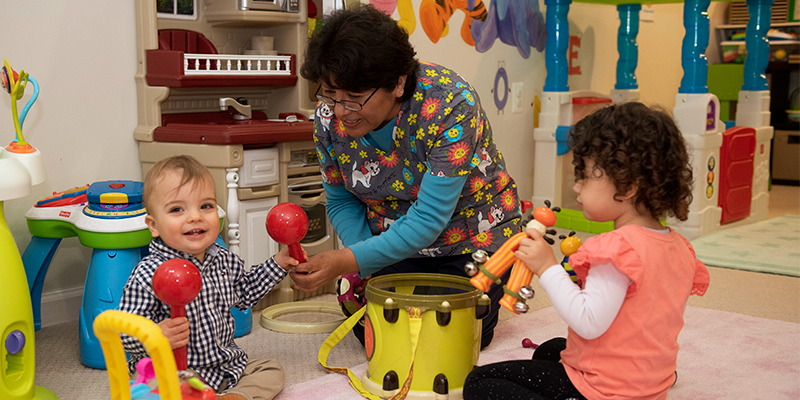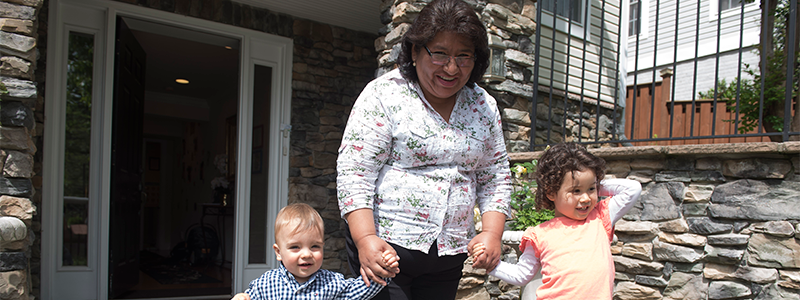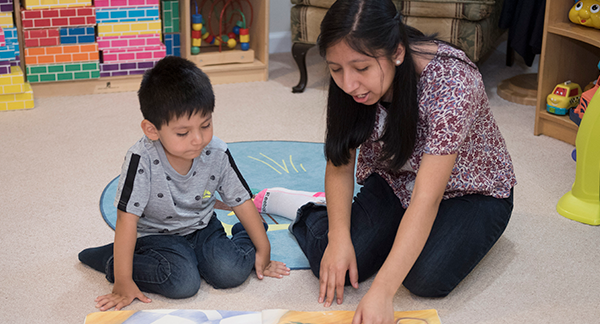
When we talk about health and safety in child care, the discussion is often focused on reducing or eliminating physical threats to children’s well-being (e.g., unsafe playground equipment or the spread of an infectious disease). CCAoA believes that child care is a place where the whole environment helps build healthy children, including their healthy social and emotional development. This is the second of four blog posts from CCAoA about promoting social and emotional health – in this case, through a practice known as responsive caregiving.
An infant and provider are sitting on the floor. The child glances toward a nearby toy. The provider picks up the stuffed bear and hands it to the child, who reacts with a smile and a happy squeal. The provider returns the smile, makes eye contact and says, “Oh, you like the bear! I do, too. It has such big, brown eyes. Can you find the bear’s eyes?”
That’s an example of responsive caregiving, a teaching and parenting practice that promotes the social and emotional health of infants and toddlers. It involves:
- Tuning into a child’s cues – eye gazes, gestures, facial expressions, sounds, etc.
- Thinking about what the child is trying to communicate and
- Responding to the child in a sensitive way
Responsive caregiving recognizes that every child has unique needs and preferences and that young children learn best through back-and-forth social interactions with trusted adults.
How does it help infants and toddlers?
Responsive caregiving sends children the message that they are important, their needs will be met, and their unique temperament and characteristics are respected. If a caregiver (parent/guardian and/or provider) is attuned to a child and responds consistently, the child feels safe and supported. It allows an infant or toddler the freedom to learn and thrive in the company of a trusted adult.
We know that caregivers are pulled in a lot of different directions and may find it hard to promptly respond to every child’s cues for attention. Caregiving is an art, not a science. Make an effort to be as responsive as possible, as often as possible. Strong social relationships are essential to a child’s ability to build healthy social and emotional skills, and much more. They foster brain development and can affect cognition, problem-solving and learning. Early, strong relationships also positively affect longer-term outcomes such as motivation and resilience to stress.
What can CCR&Rs do?
- Referrals and consumer education: Post tips and short video clips on your website to introduce parents to the idea of responsive caregiving and show them what it looks like. If you send out resources along with your referral lists, be sure to include information about responsive caregiving for parents seeking infant and toddler care.
- Technical assistance: Train your technical assistance specialists to assess and support responsive caregiving in child care. This checklist is full of sample language, activity ideas and other valuable coaching tools that can help your technical assistance specialists work with providers to enhance responsive practices in their program.
- Advocacy: Partner with other birth to three organizations – like home visiting, early intervention programs and maternal and child health programs – to build an infant and toddler coalition in your state.
- Identify opportunities to align messaging about responsive caregiving.
- Work together to advocate for your state to make responsive caregiving a required training topic for all infant and toddler providers.
CCAoA can support your coalition-building by helping you get the right people in the room and using research to make community-informed decisions about access to high-quality infant and toddler care. Take a look at the coalition-building work (PDF Download) we did on another project and think about how we can support you.





